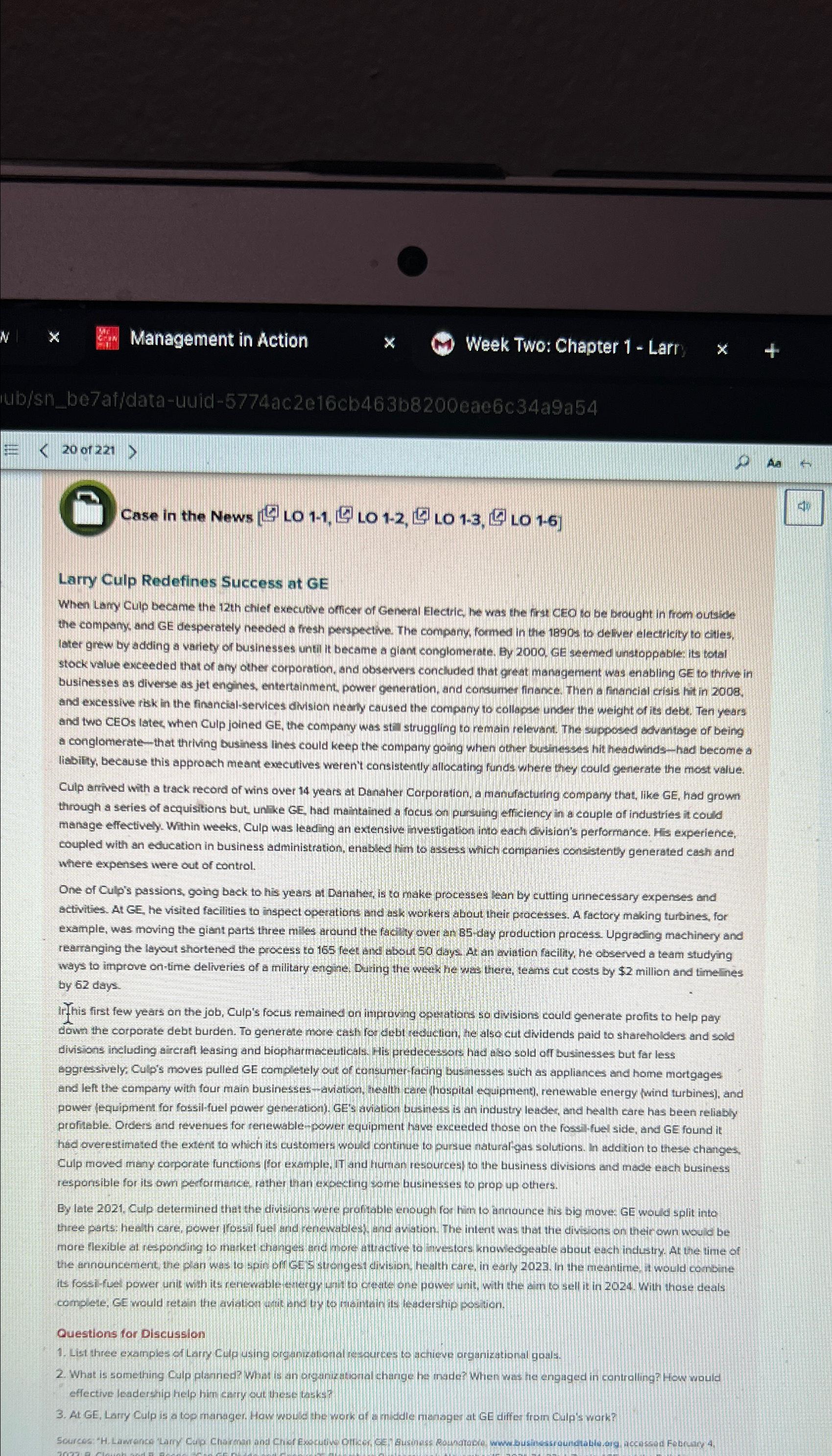Answered step by step
Verified Expert Solution
Question
1 Approved Answer
x Management in Action Week Two: Chapter 1 - Larr ub / sn _ be 7 afidata - uuid - 5 7 7 4 ac
Management in Action
Week Two: Chapter Larr
ubsnbeafidatauuidacecbbeaecaa
ot :
Case in the News LO O O LO
Larry Culp Redefines Success at GE
When Lary Culp became the th chier executive officer of General Electric, Me was the frrst CEO to be brought in from outside the company and GE desperately needed a fresh perspective. The company, formed in the s to deliver electricity to civies, later grew by adding a variety or businesses until it became a giant conglomerate. By GE seemed unstoppable its total stock value exceeded that of any other corporation, and observers concluded that great management was enabling GE to thifue in businesses as diverse as jet engines, entertainment, power generation, and consumer finance. Then a financial cisis hit in and excessive risk in the financialsenvices division neany caused the company to collapse under the weight of its debt. Ten years and two CEOs latec, when Culp joined GE the company was still struggling to remain relevant. The suppoeed advantisge of being a conglomeratethat thriving business ines could keep the company going when other busineses hit headwindshad become a lisbilty, because this approsch meant executives weren't consistently allocating funds where they could generate the most value.
Culp arrived with a track record of wins over years at Danaher Corporation, a manufacturing company that, like GE had grown through a series of acquisitions but, unike GE had maintained a focus on pursuing efficiency in a couple ar industries it could manage effectivety. Within weeks, Culp was leading an exiensive investigation imo each division's performance. His experience, coupled with an education in business administration, enabled him to assess which companies coneistenty generated cash and where expenses were cut of control.
One of Culp's passions, going back to his years at Danahte, is to make processes lean by cutting unnecessary expenses and activities. At GE he visited facitiles to inspect operations and ask workers about their processes. A factory making turbines, for example, was moving the giant parts three miles around the facity over an day production process. Upgrading machinery and rearranging the layout shortened the process to feet and ubout So days At an wiation facilhy, he observed a team studying Ways to improve ontime deliveries of a military engine. During the wexk he what there, teans cut costs by $ million and timenenes by days.
IThis first few years on the job, Culp's focus remained on improving cputations so divisions could generate profits to help pay down the corporate debt burden. To generate more cash for debt zeduction, he also cut cividends paid to shareholders and sold divisions including aireraft leasing and biopharmeceuticals. Wis predecessots had aso sold of businesses but far less aggressively, Culp's moves pulled GE completely out of consumerfading businesses: suich as appliances and hame mortgages and left the compary with four main businessesaviation, thealth care hospital equipment, renewable energy wind turbines and power equipment for fossilfuel power generation GE's aviation business is an industry leadec, and health care has been reliably profitable. Orders and revenues for renewablepower equipment have exceeded those on the fossilflel side, and GE found it had overestimated the extem to which its customers would continue to pursue naturafgas solutions. In addtion to these changes Culp moved many corporate functions for example, it and fuman resources to the business divisions and made each business responsible for its owm petformance, rather than expecting some businesses to prop up others.
By late Culp determined that the divisions were profitable: enough for him to announce his big move; GE would split into three parts: heath care, power rossi fuel and renevablest, and aviation, The intent was that the divesions on their own would be more flexible al responding to matket changest end more atractive to limestors knoweogeable about each industry. At the time of its fossiluel power unit whit its renewableenergy unit to ceate one powe unit, with the dim lo sell it in With those deals
Questions for Discussion
List three examples of Lary Culp using organizatonal resources to achieve organizational goals.
What is something Culp planned? What is an organizational change he made? When was he engaged in controlling? How would effective leaderehip help him carry out these tasks?
At GE Larry Culp is a top manager. Haw woula the work of a middle manager at GE differ from Culp's wark?

Step by Step Solution
There are 3 Steps involved in it
Step: 1

Get Instant Access to Expert-Tailored Solutions
See step-by-step solutions with expert insights and AI powered tools for academic success
Step: 2

Step: 3

Ace Your Homework with AI
Get the answers you need in no time with our AI-driven, step-by-step assistance
Get Started


